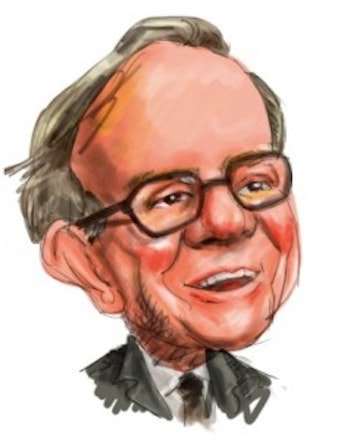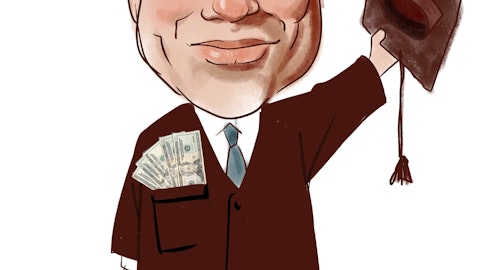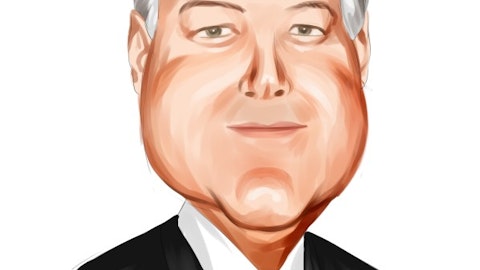
But no one’s joking anymore. “A number of Berkshire shareholders — including some of my good friends — would like Berkshire to pay a cash dividend,” Buffett said in his latest letter to shareholders.
Who’s going to win this battle?
In 1998, a student at the University of Florida asked Buffett about dividends. Buffett repeated the question for the crowd. “The question is about evaluating Berkshire Hathaway, Inc. (NYSE:BRK.B) when it doesn’t pay any dividends,” he said. “And it won’t pay dividends, either. That’s a promise I can keep. All you get with Berkshire stock is that you can stick it in your safe deposit box, and every year you take it out and fondle it. “
So there’s that.
But the question keeps popping up. It has become almost ritualistic for a shareholder to ask Warren to pay a dividend at its annual shareholder meeting in Omaha.
In the latest letter to shareholders, Buffett brought up a great rebuttal. You want a dividend? Make one yourself by selling some of your fondled stock certificates. You get the cash you wanted, and it’s far more efficient than Berkshire Hathaway, Inc. (NYSE:BRK.B) paying an actual dividend.
Buffett used an example of a small business with two shareholders. Imagine a business worth $2 million and earning $240,000 a year. Shares are worth 125% of book value on the open market. Profits can be reinvested back into the business and earn 12% per year, but the two owners want some cash to pay their bills, and opt to take one-third of the company’s profits out as a dividend every year.
After 10 years the two owners would own shares worth $2.7 million each, and pull in dividends worth $86,000 per year. “And we would live happily ever after — with dividends and the value of our stock continuing to grow at 8% annually,” Buffett writes.
But another option is available to the two owners:
Under this scenario, we would leave all earnings in the company and each sell 3.2% of our shares annually. Since the shares would be sold at 125% of book value, this approach would produce the same $40,000 of cash initially, a sum that would grow annually. Call this option the “sell-off” approach.
Under this “sell-off” scenario, the net worth of our company increases to $6,211,696 after ten years ($2 million compounded at 12%). Because we would be selling shares each year, our percentage ownership would have declined, and, after ten years, we would each own 36.12% of the business. Even so, your share of the net worth of the company at that time would be $2,243,540. And, remember, every dollar of net worth attributable to each of us can be sold for $1.25. Therefore, the market value of your remaining shares would be $2,804,425, about 4% greater than the value of your shares if we had followed the dividend approach.
Moreover, your annual cash receipts from the sell-off policy would now be running 4% more than you would have received under the dividend scenario. Voila! — you would have both more cash to spend annually and more capital value.
Over Berkshire’s history, Buffett writes, “the sell-off policy would have produced results for shareholders dramatically superior to the dividend policy.” Money that would have been paid out as a dividend was invested by the world’s greatest investor. By 2012, that $0.10 per-share dividend paid in 1967 while Buffett was in the bathroom would have been worth $0.90 if put in Treasuries, $4.83 if invested in the S&P 500, or $326 if invested in Berkshire.
And at any time, Berkshire shareholders could have sold a portion of the gain, creating their own annual dividend.
Selling shares is also the most tax efficient way to reward shareholders. “Under the dividend program, all of the cash received by shareholders each year is taxed whereas the sell-off program results in tax on only the gain portion of the cash receipt,” Buffett wrote.
Back at the University of Florida, Buffett explained when a company should forgo dividends: “The real question is whether we can keep retaining dollar bills and turning them into more than a dollar at a decent rate.”
Most businesses can’t, at least compared with other investment opportunities. In an interview last year, investor Rob Arnott criticized companies retaining huge portions of their earnings:
There’s an arrogance to the notion that our best internal reinvestment opportunity within our company is better than our shareholder’s best reinvestment opportunity in the entire world of investing. And that’s what tacitly being said by hanging on to all of the earnings.
But that “arrogance” makes sense with Buffett. Berkshire’s book value has grown by an average of 11.9% per year over the last decade, compared with a 6.6% average annual return for the S&P 500. In fact, the reason most Berkshire investors own the stock is specifically because they believe in Buffett’s ability to compound retained earnings. No one should want to own Berkshire because it owns shares of Coca-Cola. You should want to own Berkshire because Buffett has the wisdom to buy shares of Coca-Cola at the right time and the right price. He needs retained earnings to do that.
So, you want Berkshire to pay a dividend? Great, go sell a portion of last year’s capital gains. Most investors won’t, because they don’t want to sell an investment capable of compounding money year after year. Which is exactly why Berkshire doesn’t pay a dividend.
The article Buffett: You Want a Dividend? Go Make Your Own originally appeared on Fool.com and is written by Morgan Housel.
Morgan Housel owns shares of Berkshire. The Motley Fool recommends Berkshire Hathaway. The Motley Fool owns shares of Berkshire Hathaway.
Copyright © 1995 – 2013 The Motley Fool, LLC. All rights reserved. The Motley Fool has a disclosure policy.





